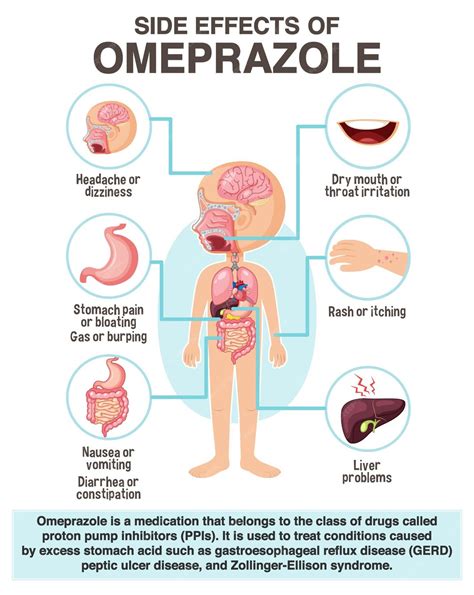Omeprazole 40 Mg Side Effects

Omeprazole, a medication commonly used to treat conditions like gastroesophageal reflux disease (GERD), Zollinger-Ellison syndrome, and peptic ulcers, is available in various dosages, including 40 mg. The 40 mg dosage is often prescribed for more severe cases or when the lower doses are not effective. Like any medication, omeprazole can cause side effects, which can vary from mild to severe. Understanding these side effects is crucial for patients to make informed decisions about their treatment.
Common Side Effects
Common side effects of omeprazole 40 mg are generally mild and may include: - Headache: One of the most frequently reported side effects. - Diarrhea: Loose, watery stools can occur, especially during the initial stages of treatment. - Nausea and Vomiting: Feeling queasy or actually vomiting can happen, though this might seem counterintuitive for a medication meant to reduce stomach acid. - Abdominal Pain: Some patients may experience stomach pain or discomfort. - Constipation: The opposite of diarrhea, some individuals might find it harder to have bowel movements. - Fatigue: Feeling tired or weak is another common side effect. - Dizziness: Some people might feel lightheaded or dizzy.
Less Common but Serious Side Effects
While less common, there are more serious side effects that require immediate medical attention: - Severe Allergic Reactions: Symptoms can include rash, itching, swelling (especially of the face/tongue/throat), severe dizziness, and trouble breathing. - Vitamin B12 Deficiency: Long-term use of omeprazole can lead to a deficiency in vitamin B12, particularly in elderly patients or those with a pre-existing condition affecting vitamin B12 absorption. - Low Magnesium Levels (Hypomagnesemia): Prolonged use can cause magnesium levels to drop, leading to symptoms like muscle cramps, spasms, or weakness. - Increased Risk of Osteoporosis-related Fractures: Long-term and high-dose use of omeprazole can increase the risk of fractures of the hip, wrist, or spine. - Clostridioides difficile (C. diff) Associated Diarrhea: Patients on omeprazole are at a higher risk of developing C. diff infections. - Lupus Erythematosus: Though rare, some patients may develop systemic lupus erythematosus, an autoimmune disease.
Rare but Serious Side Effects
Rare side effects that are more severe and require immediate medical attention include: - Kidney Damage: Symptoms can include a decrease in urine output or swelling in your legs, ankles, or feet. - Severe Skin Reactions: Conditions like Stevens-Johnson syndrome or toxic epidermal necrolysis, though extremely rare, can be life-threatening. - Interactions with Other Medications: Omeprazole can interact with various medications, either reducing their effectiveness or increasing the risk of side effects. Examples include warfarin, diazepam, phenytoin, and medications for HIV.
Managing Side Effects
If you experience any side effects while taking omeprazole 40 mg, it is crucial to discuss them with your healthcare provider. They can offer advice on managing side effects or may adjust your dosage or switch you to a different medication. Additionally, keeping a diary of when side effects occur and any factors that might trigger them can be helpful in managing your treatment plan.
Conclusion
While omeprazole 40 mg can be an effective treatment for various gastrointestinal disorders, being aware of its potential side effects is essential. Patients should always follow their prescribed treatment regimen and consult their healthcare provider if they experience any side effects or have concerns about their medication. Effective communication between patients and healthcare providers is key to balancing the benefits of treatment with the management of potential side effects.
What are the most common side effects of omeprazole 40 mg?
+The most common side effects include headache, diarrhea, nausea, abdominal pain, constipation, fatigue, and dizziness.
Can omeprazole cause severe side effects?
+Yes, while less common, omeprazole can cause severe side effects such as severe allergic reactions, vitamin B12 deficiency, low magnesium levels, increased risk of fractures, and others. These require immediate medical attention.
How can I manage side effects from omeprazole 40 mg?
+It’s essential to discuss any side effects with your healthcare provider. They can offer advice, adjust your dosage, or switch your medication. Keeping a diary of side effects can also be helpful.
Should I stop taking omeprazole if I experience side effects?
+No, you should not stop taking omeprazole without consulting your healthcare provider first. Stopping the medication abruptly can lead to worsening of the underlying condition. Your healthcare provider can guide you on the best course of action.
How long does it take for side effects of omeprazole to appear?
+


